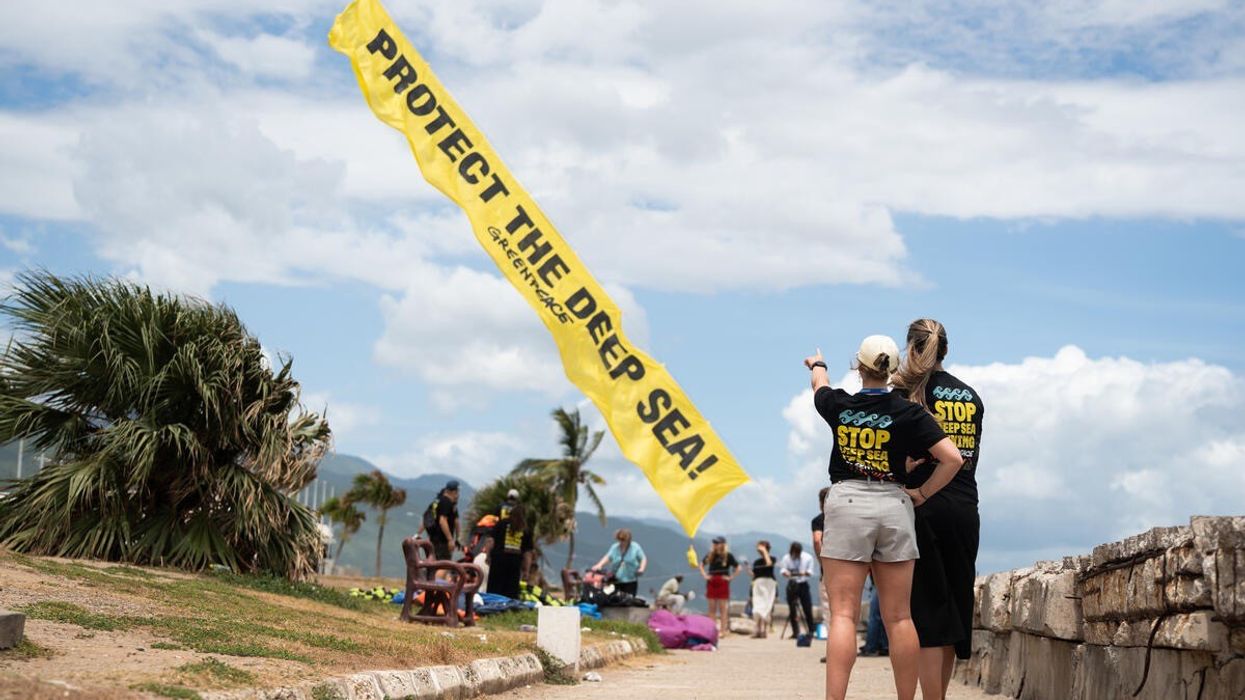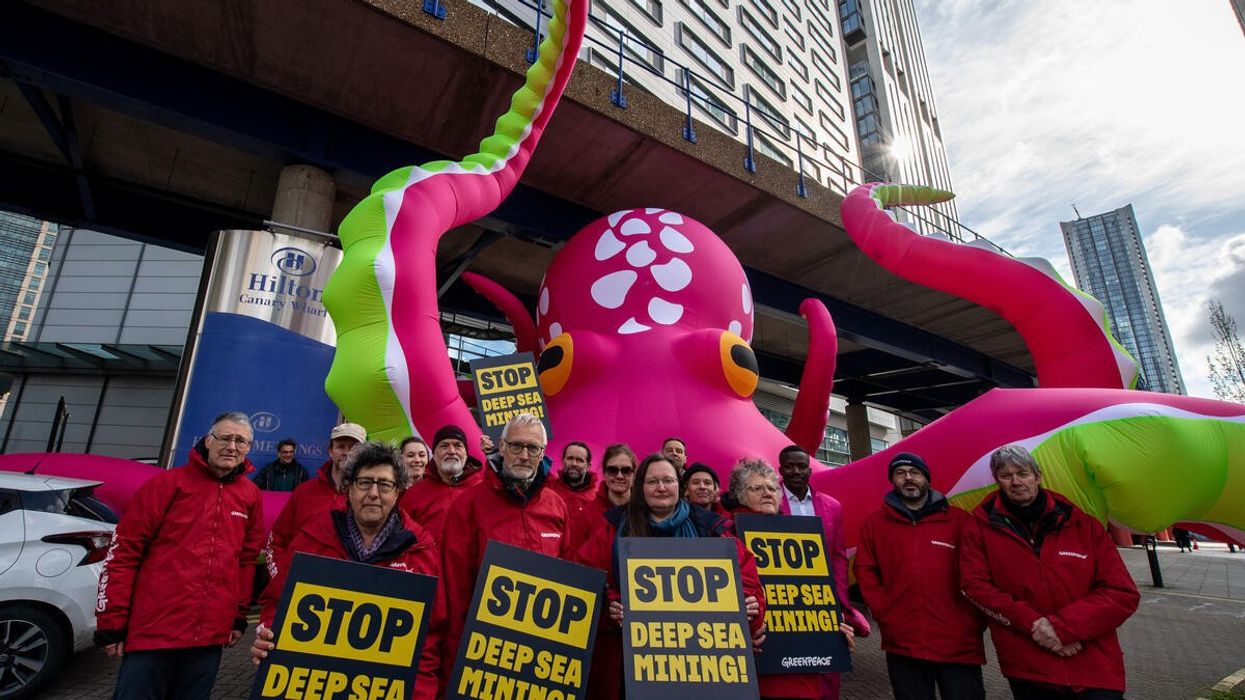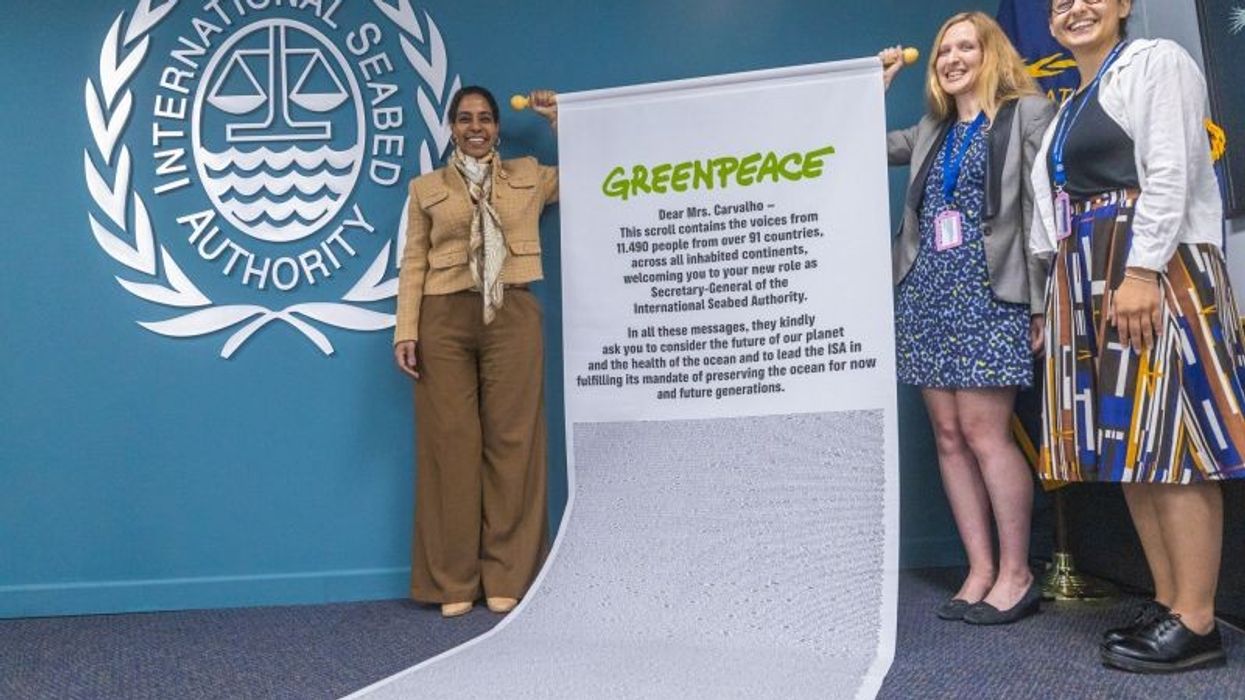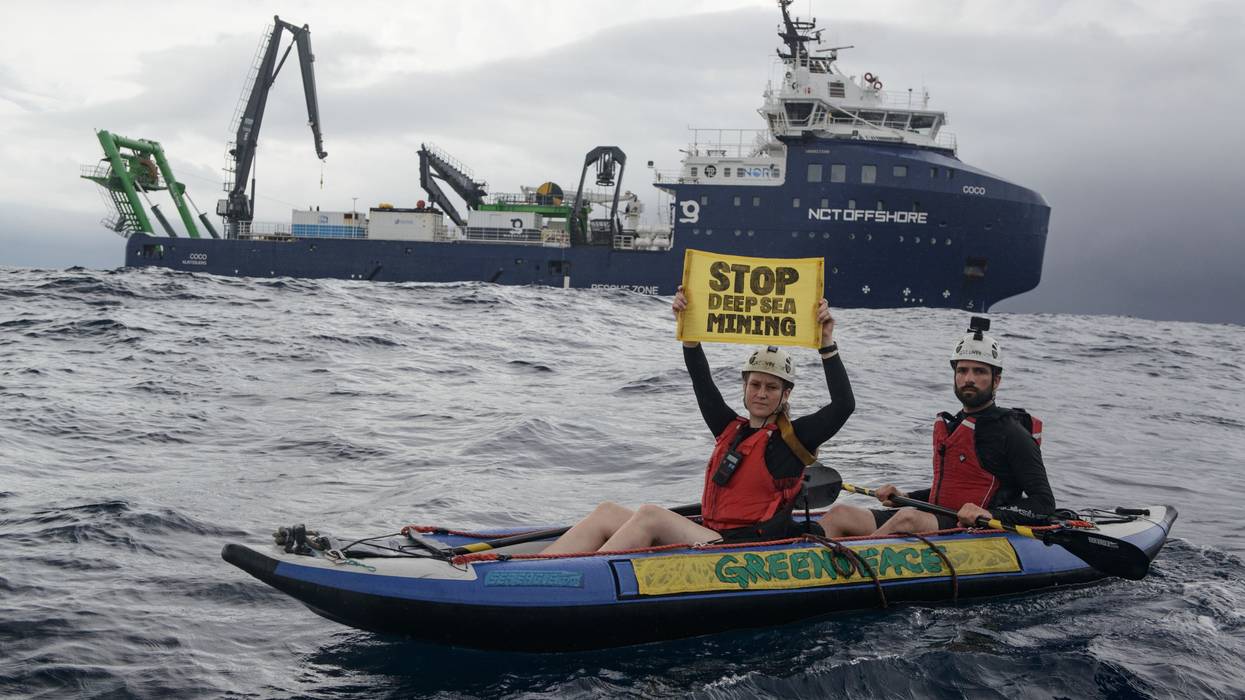Governments Fail to 'Rise to the Moment' as Seabed Meeting Ends Without Mining Pause
"There is still a chance to stop this industry before it begins, but only if governments stand up for science, equity, and precaution now," one campaigner said.
Despite growing momentum, world governments failed to agree to a moratorium on deep-sea mining as the 30th session of the International Seabed Authority wrapped up on Friday.
The authority's July meeting was the first since U.S. President Donald Trump signed an executive order to expedite permits for deep-sea mining under U.S. authority and The Metals Company (TMC) promptly applied for U.S. permits. Governments rebuked the U.S. and TMC for their unilateral approach and did not agree on a mining code that would allow the controversial practice to move forward under international law. However, campaigners said more decisive action is needed to protect the ocean and its biodiversity.
"Governments have yet to rise to the moment," Greenpeace International campaigner Louisa Casson said in a statement. "They remain disconnected from global concerns and the pressing need for courageous leadership to protect the deep ocean."
Casson continued: "We call on the international community to rise up and defend multilateralism against rogue actors like The Metals Company. Governments must respond by establishing a moratorium and reaffirming that authority over the international seabed lies collectively with all states—for the benefit of humanity as a whole."
Defending Multilateralism
The International Seabed Authority (ISA) gains its authority to regulate deep-sea mining under the United Nations Law of the Sea, to which the U.S. is not party. TMC, however, could suffer consequences for bypassing the international process, as other countries and companies may decide not to do business with it.
At the most recent session, the ISA's council decided not to revoke exploratory permits it had previously granted to TMC and its subsidiaries. However, it approved an investigation on Monday into whether mining contractors such as TMC subsidiaries Nauru Ocean Resources Inc. and Tonga Offshore Mining Limited were abiding by their obligations under international law.
"TMC has been testing the limits of what it can get away with, a bit like a child seeing how far it can go with bad behavior," Matthew Gianni, cofounder of the Deep Sea Conservation Coalition (DSCC), told The New York Times.
"The member countries of the ISA have basically sent a shot across the bow, a warning to TMC that going rogue may well result in the loss of its ISA exploration claims," Gianna explained, adding that the investigation also served as a warning to other companies who might consider following TMC's example.
"The Trump administration's pursuit of deep-sea mining isn't about global stewardship—it's about sidestepping it."
Casson agreed: "The international community's message to The Metals Company is clear: Violating international law, ignoring scientific consensus, and disregarding human rights will have consequences. This is also a warning to any companies or governments choosing to align themselves with [TMC CEO] Gerard Barron's business model—they must be prepared to bear the reputational fallout of trying to destroy the ocean."
At the same time, a U.S. representative spoke on Thursday, doubling down on Trump's dismissal of the international process and earning instant push back from Brazil, France, and China
"As a non-party to the Law of the Sea Convention, the United States is not bound by the convention rules dealing with seabed mining through the International Seabed Authority," the U.S. statement said in part.
The statement came days after Greenpeace released a report titled Deep Deception: How the Deep-Sea Mining Industry is Manipulating Geopolitics to Profit from Ocean Destruction, which details how TMC and other deep-sea mining companies are exploiting national security concerns to lobby U.S. lawmakers to fast track deep-sea mining.
"The U.S. statement confirms what Deep Deception has already exposed: The Trump administration's pursuit of deep-sea mining isn't about global stewardship—it's about sidestepping it," Arlo Hemphill, Greenpeace USA's project lead for the Stop Deep-Sea Mining campaign, said in a statement. "By rejecting the ISA's authority while claiming environmental responsibility, the U.S. is trying to have it both ways—and in doing so is advancing a 'smash and grab' agenda that puts ocean health and international cooperation at serious risk."
'Growing Resistance'
Ultimately, ocean advocates agree that the only way to protect the deep sea is for governments to agree to a precautionary pause on a practice they argue would do irreparable harm to ecosystems science barely understands.
The consensus for such a pause is building, with Croatia becoming the 38th nation to support one during the latest ISA meeting.
"The ISA is paralyzed by a small group clinging to outdated extraction agendas while blocking even the most basic reforms," Simon Holmström, the deep-sea mining policy officer for Seas at Risk, said in a statement. "The firm rejection of the U.S. and The Metals Company's power grab, alongside 38 countries now calling for a moratorium or precautionary pause, shows growing resistance to sacrificing the planet's least understood ecosystem for corporate short-term profit."
"To even consider a new form of ecocide on our already ailing planet is both reckless and irrational."
Several nations spoke strongly in favor a moratorium, including Palau, Panama, and France.
"Exploiting the seabed is not a necessity—it is a choice," said His Excellency Surangel S. Whipps Jr., president of the Republic of Palau, on Tuesday. "And it is reckless. It is gambling with the future of Pacific Island children, who will inherit the dire consequences of decisions made far from their shores."
A Pacific leader from Solomon Island also defended the interests of the Pacific Ocean community: "As Pacific people, we continue to carry the trauma of what extractive industries have already done to our homes. Mining companies that came with promises, stripped our lands and waters, and left behind ecological, cultural, and spiritual scars. We cannot let that cycle repeat itself, in the ocean that connects us. That sustains us. And that defines us."
Olivier Poivre d'Arvor of France called for a pause of 10-15 years: "Our message is clear: no deep-sea mining without science, without collective legitimacy, without equity [...] France is calling for a moratorium or a precautionary pause. What for? Because we refuse to mortgage the future for a few nodules extracted in a hurry, in favor of a few."
However, campaigners argued that many governments continued to fall short of the commitments they had made at the U.N. Ocean Conference (UNOC) in Nice in early June.
"Thirty-eight states have now joined the call for a moratorium or precautionary pause, with Croatia joining the coalition during this Assembly," said DSCC campaign director Sofia Tsenikli. "But too many other states, which were bold in their ocean promises at UNOC, are not putting this into action at the ISA. Governments must meet their promises by doing what it takes to implement a moratorium before it's too late."
Farah Obaidullah, founder and director of The Ocean and Us, argued that the ocean already faces too many other threats to add the additional burden of deep-sea mining.
"The health of the high seas including the seabed is critical to our own. Yet our shared heritage faces an onslaught of threats from climate and nature collapse, escalating tensions, and failed leadership," Obaidullah said. "To even consider a new form of ecocide on our already ailing planet is both reckless and irrational. We know that deep-sea mining will devastate life in the deep ocean, wipe out species before they have been discovered, and impact ocean functions, including carbon sequestration. When it comes to the ocean we have no time to lose. We cannot colonize and conquer our shared heritage which belongs to us all. There is only one responsible way forward, and that is to secure a moratorium on deep-sea mining."
DSCC's Gianni also argued strongly for a pause: "Being on the fence or remaining silent is not a politically defensible position. We are risking severe ecological damage, and future generations will ask what we did to stop it. There is still a chance to stop this industry before it begins, but only if governments stand up for science, equity, and precaution now, and take action to prevent companies within their jurisdiction from cooperating with rogue mining operations."
Greenpeace's Hemphill concluded: "Governments must secure a moratorium that leaves no room for a desperate industry to force through a mining code. The science is not ready. The legal framework is not in place. The world must not be bullied into an irreversible mistake for the benefit of a few."



